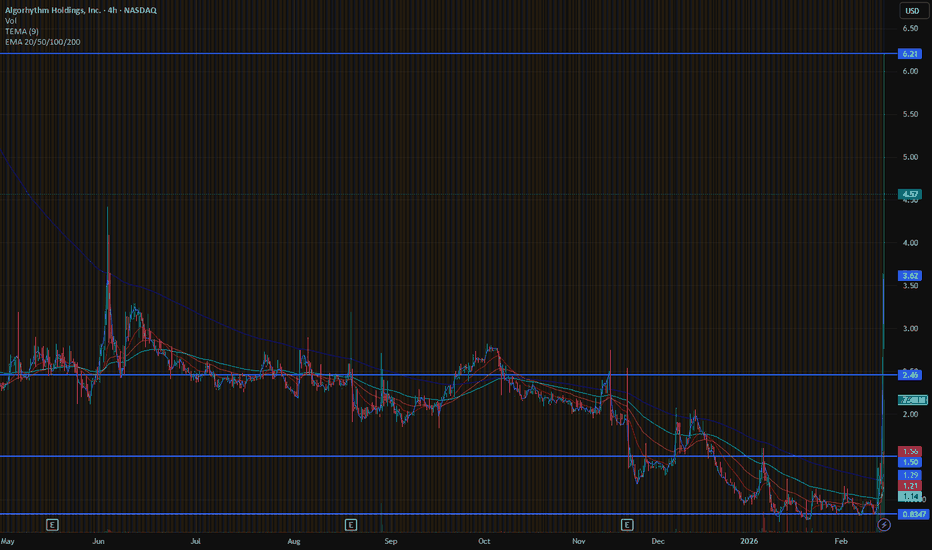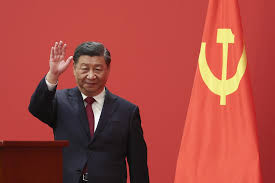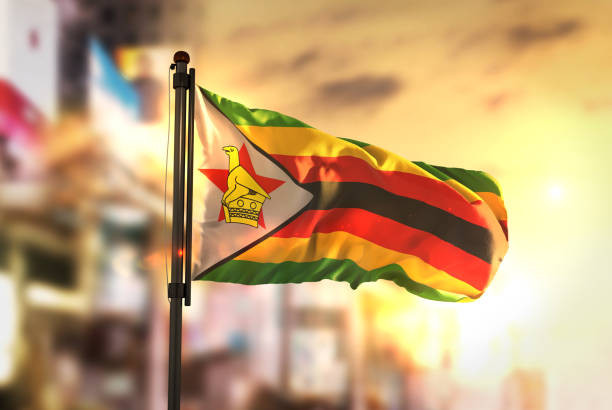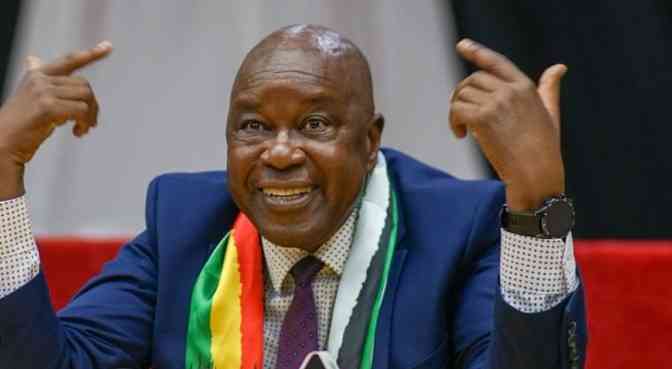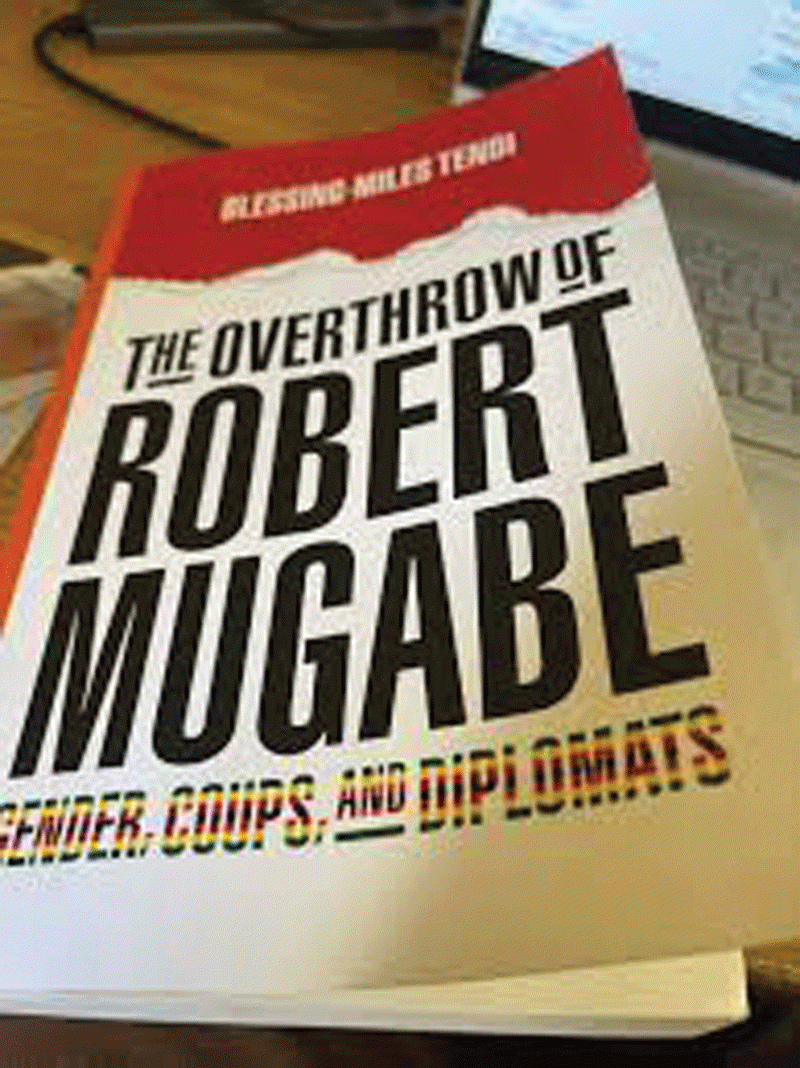
Let me begin my submission with a disclaimer that this is no way an attempt at a review or critique of Miles Tendi compelling and scholarly account on the political demise of Zimbabwe's late founding and long serving leader, as obtained in the book "The overthrow of Robert Mugabe: Gender, Coups and Diplomats".
Rather, this article is a reflective piece on some of the main highlights of Tendi's account of the drivers of the military intervention that deposed Robert Mugabe as both the state president and leader of one of the country's and regional liberation movement parties, the Zimbabwe African National Union Patriotic Front (Zanu PF).
Not that much of what Tendi discusses in this very informative body of literature is out rightly new or outside the public domain, the book sets the tone for critical engagement among public intellectuals and indeed the media.
In this article, I will particularly focus on some of the key nuggets off Tendi's book as these relate to the unresolved succession politics post the military intervention, the sustained gender challenge - itself a main component of Tendi's book and the role, perhaps more succinctly the declining interests of the international community in the Zimbabwean affairs.
Linked to the declining interests of the international community on Zimbabwean affairs, I zoom into how the reconfiguration of foreign policy by most Western capitals, fuelled by the rise of right wing and conservative governments have immensely contributed to democracy regressing in Zimbabwe.
Like in 2017, there seems to be no agency in the response mechanisms by the Zimbabwean organized political opposition parties, or whatever is left of it, to an extent that again it seems leadership change in the country is largely an internal ZanuPF battle.
Civic society is handicapped on numerous fronts, not least due to the dwindled funding for operations but often playing catch up in the constantly shifting battle fronts, where the state stretches civics from one issue to another.
In any event, there is an existential threat confronting civic society in the form of the amended Private Voluntary Organizations (PVO) law that could result in the criminalization of activism outside the legally set parameters.
- Mwonzora skeletons tumble
- Mwonzora skeletons tumble
- Mr President, you missed the opportunity to be the veritable voice of conscience
- ED to commission new-look border post
Keep Reading
My final reflections seek to locate what would be the role of the media in such a complex terrain, worse at a time that the sector has institutionally been weakened - in some instances out rightly captured and economically incapacitated to make any meaningful interpretation of the national question.
But firstly, in engaging with Tendi's assessment of the eventual overthrow of Mugabe, it is imperative to respond to the question on whether the military intervention in any way resolved the succession question within the ruling party.
There is no question about Mugabe having failed to resolve the succession question on his terms prompting him to be removed by a military intervention.
The main challenge that confronted the nonagenarian leader had been his age and the over a decade mantra agitating for his removal from office.
Popularized by the organized labor movement, jointly with other civic and pressure groups to morph into a mass political movement and party, the Movement for Democratic Change (MDC) hyped up the "Mugabe must go" mantra.
On that account, it was relatively easy to galvanize the citizenry base in the calls for his removal - with support and protection from the military.
Now his successor, President Emmerson Mnangagwa is again faced with a succession challenge, which in this instance is now a function of the country's constitution.
At law, he cannot serve beyond 2028.
This then opens up for a battle of his succession, predominantly from within his party.
From what is playing out in the public domain, President Mnangagwa seems to be playing his cards close to his chest, with no public pronouncements as to his preferred candidate.
His supporters are popularizing the "2030" mantra, with suggestions of amending the constitution for the president to serve beyond what the law provides.
Though he has denied having such ambitions himself, he hasn't publicly reprimanded his supporters to stop the "2030" calls.
This has to an extent fuelled the succession debate from mere murmurs to sometimes public exchanges, the most evident being the ones that played out between factions of war veterans.
All these factional spectacles playing in full public glare, are remnants of the 2017 military intervention, which on this basis did not resolve how Zanu PF can manage transition but merely reinforced a system that had been personified by Mugabe.
Even then, much like in 2017 the gendered dynamics of the military intervention exists now as it did then - albeit with a slightly tinkered context.
But the prominence of the first lady and her visibility in government affairs, the maligning and side-lining of women politicians and their role thereof and the piecemeal affirmative intervention of extending the women quotas in parliament remains the gendered challenge of the politics of Zimbabwe.
High profile cases, such as the Mary Chiwenga case have been read through gendered succession lenses and leaked audios of high profile women politicians, including the first lady and a cabinet minister are some of the available evidence of gender's role in the politics of Zanu PF, which by and large inform that of the country.
Tendi's account narrates the complex role that the international community played at the time leading to the overthrow of Mugabe.
While he doesn't necessarily draw conclusions as to the extent of interests among the international community on the political developments in Zimbabwe, there is an evident thread of international fatigue and growing disinterest in the southern African country, which definitely resonates in the context of the current geopolitics.
Not only are countries in the region and indeed the world seized with domestic challenges, not least with the economic recession, most states now view diplomacy more from a direct investment and economic integration than it is about fostering a global family of nations.
Zimbabwe's issues have perennially been on the regional and international agenda but with minimal return on the investment towards dialogue and reforms.
While Zimbabwe's attempt at ending decades long international isolation remains somewhat on the agenda amid a public relations mantra of being open for business and friend to all, the country has missed critical milestones set for the re-engagement efforts to bear fruit.
If anything, reports on Zimbabwe, including but not limited to those by election observer missions have highlighted glaring democratic deficiencies in the country that derails investor confidence.
The Southern Africa Development Community (Sadc) preliminary report on the 2023 elections is probably the most critical the region has been on how Zimbabwe governs elections and the country's democratic processes.
In any event, the promise of the military intervention of a new dawn of a stable economy hinged on macroeconomic discipline has largely been unfulfilled with the country still reeling from policy inconsistencies, market manipulation and corruption.
This political and economic instability, which by nature has security threat connotations has driven away investors and is indeed a huge cost on the country's development trajectory.
Perhaps what is even more of a challenge is how democracy is under siege globally.
The illegalities that are now finding expression in more mature democracies, including in the United States of America in such brazen fashion, is setting the bar too low for the developing countries.
These mature democracies are increasingly losing any moral authority to criticise authoritarianism across the world.
In any event, the international community, which would ordinarily support civic society and developmental work is significantly cutting aid and with that interest in how governments are treating their citizens.
To that extent there's less appetite to provide response mechanisms and support to countries in democratic distress like Zimbabwe and there will be less involvement in defining the national question. Especially outside pure trade and economic relations.
Another glaring similarity of the period in which Mugabe is overthrown and the current context is the role of organized political opposition parties and civic society.
Again, like in 2017, the succession battle is taking place at a time that the opposition is institutionally weak to dictate the political agenda.
While some opposition leaders, particularly those that associate or align with the politics of Nelson Chamisa, in my view, remain popular - there's little to suggest that this popularity can be translated into political power in the near future.
Again as was in 2017, the political opposition's agenda is going to be determined by the going ons in the ruling party and perhaps their standpoint and real political currency will be in pushing back against the 2030 mantra and forcing an election sooner at best or at worst in 2028 when these are constitutionally due.
I have already discussed the challenges that confront civic society and without citizens agency in mobilising and supporting civic work, there's minimal expectations of organic political response emerging thereof.
I would have been interested to read more on the media's role during the overthrow of Mugabe outside the sector's role as a mere transmitter and functionary of disseminating news and information.
Tendi merely records the media as an extension of power, including international media whose messaging conformed with the respective stances that their capitals would have taken.
Of course, Tendi never in his brief purported to any way or form analyze the media, but as a media development practitioner I believe a critical analysis on the role of the media - particularly independent media would add value not only to academia but also to inform policy interventions.
It certainly cannot be sustainable for the media to be a lapdog of sorts without agency to freely analyze and critique the national question.
Independent journalism is not and should not be regarded as an utopian idea that exists as a mere aspiration.
It is a professional and constitutional imperative that should be promoted and safeguarded in equal measure.
Zimbabwe is again at the crossroads, with some political developments reminiscent of the period that Tendi covers in his book already finding expression in what is currently obtaining.
The clarion call is for independent journalism to be supported to be equipped, sustainable and capacitated to interpret the national question for Zimbabwe. The extent at which excellent journalism can dissect for readers and audiences the import of what confronts Zimbabwe today is one sure way for the media to reconnect with the audiences they badly need now and into posterity.
*Nigel Nyamutumbu is a media development practitioner based in Harare. He can be contacted on [email protected] or +263 772 501 557

